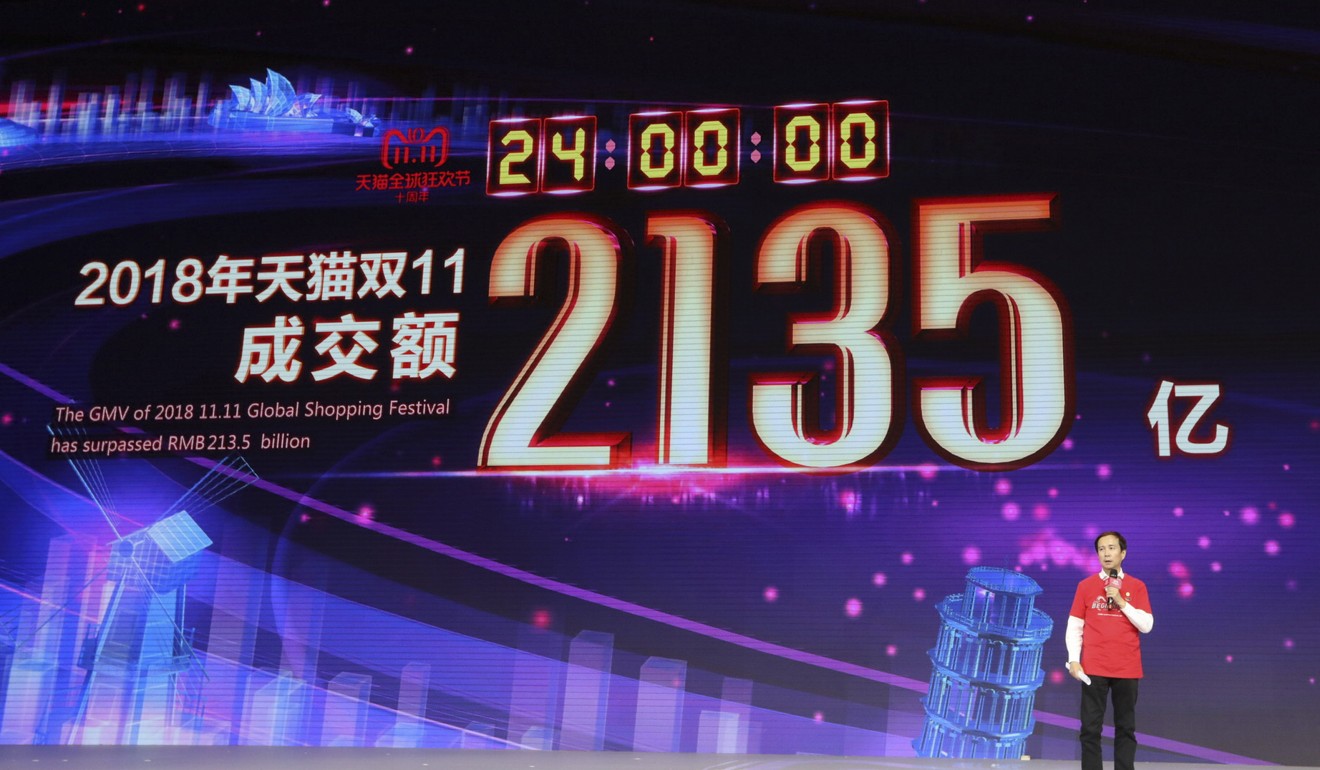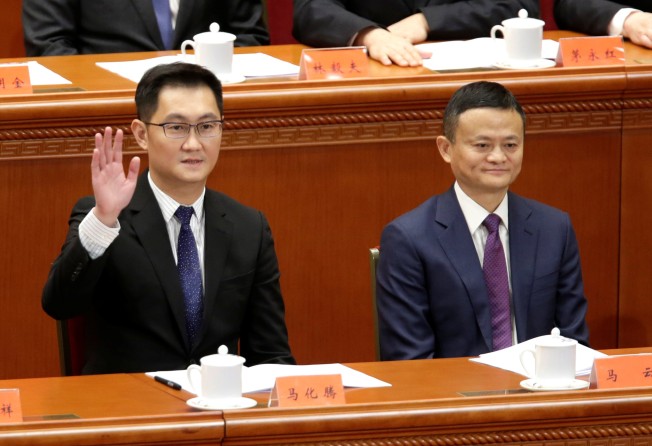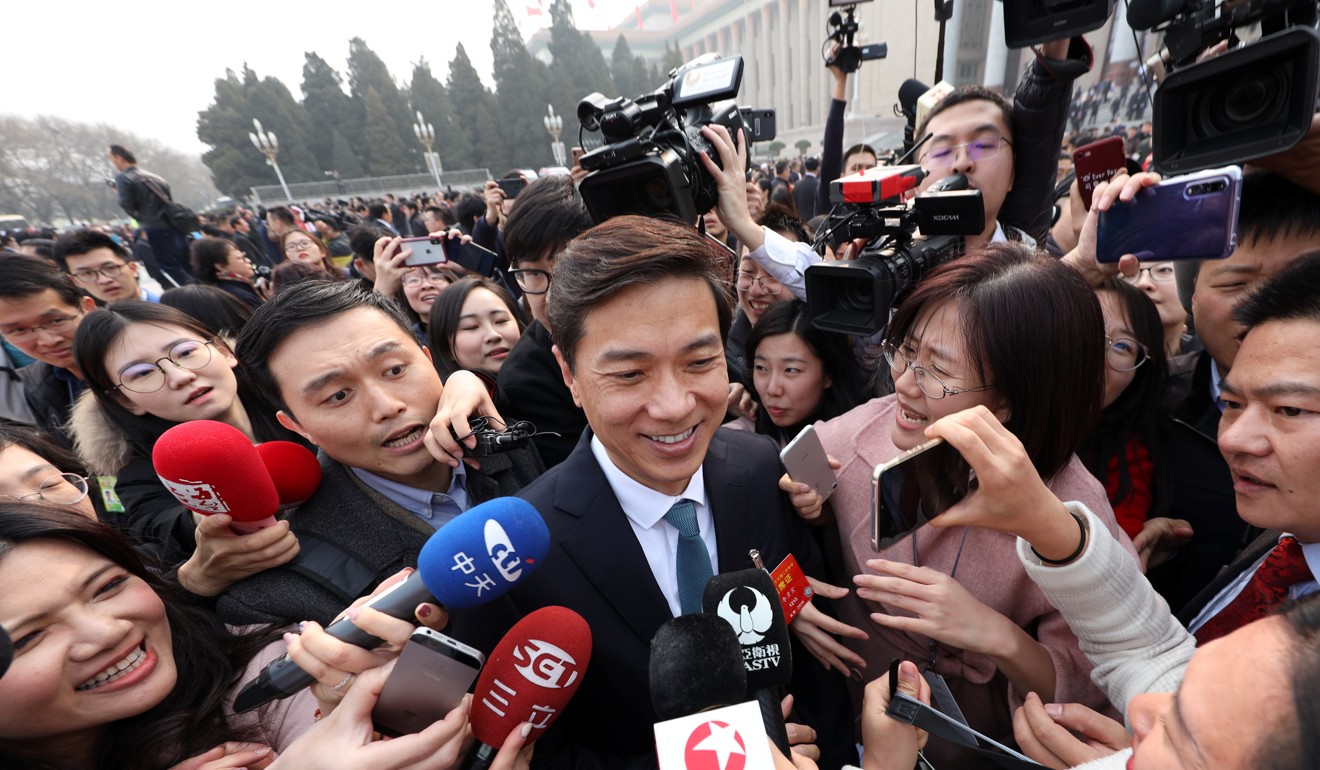
Alibaba, Tencent earnings to be watched for clues on consumer sentiment in China as trade war swirls
- Alibaba’s earnings are driven by its e-commerce engine, services, entertainment and cloud computing – meaning domestic consumption is always a key factor

Alibaba Group Holding and Tencent Holdings will both report quarterly earnings on May 15, followed by Baidu on May 16, which will be closely scrutinised for any indication that growing trade tensions between the world’s two-biggest economies are impacting consumer sentiment in China.
Alibaba
China’s largest e-commerce operator blew past profit estimates in the previous quarter on growth in gross merchandise volume (GMV) and its cloud services business despite a slowing domestic economy.
Alibaba’s earnings are primarily driven by its core e-commerce engine, consumer services, entertainment and cloud computing – not exports – meaning the health of domestic consumption is always a key factor. Investors will also scour the earnings report for any sign that growing competition from the likes of group-buying platform Pinduoduo is biting.
China's improved consumer sentiment in the March quarter is expected to benefit results though and consensus analyst estimates are for sales growth of 48 per cent in the fourth quarter, up from 41 per cent growth in the third, helping Alibaba meet its fiscal 2019 sales guidance of 375-383 billion yuan, according to a poll by Bloomberg.
“Although e-commerce remains the core, Alibaba’s growth is driven by synergy effects from its entire ecosystem and this means that side businesses such as cloud, local consumer services and new retail will remain as important areas for the company,” said Danny Law, a Hong Kong-based research analyst at Guotai Junan International Holdings.
Alibaba shares tanked along with many tech stocks in the second half of 2018 amid the darkening trade picture and as China’s red hot tech sector cooled off, but after hitting a low of US$130.50 in January this year they recovered to touch a year high of US$195 in early March.

However, last week’s move by the US to raise tariffs from 10 per cent to 25 per cent on US$200 billion of Chinese goods has seen this advance pared back to US$170, compared with a record high for the stock of US$210.86 in June 2018.
The escalating trade war may see Alibaba put more emphasis on helping domestic brands sell more goods. The e-commerce giant’s founder Jack Ma has previously described the China-US trade spat as the “most stupid thing in the world” but an issue that could last up to two decades.
Jiang Fan, who runs the company’s core e-commerce businesses, said the company wants to double transaction volumes on its Tmall service (where businesses sell to consumers) within three years by incubating another 100 new brands that do annual business of 1 billion yuan apiece, according to a Bloomberg report last month.
Alibaba, which is also the biggest digital advertising platform in China due to merchants wanting to promote their items, has also been testing new ad feeds that appear alongside recommended items in Taobao (where consumers sell to each other) to provide what it calls “super recommendations”.
JP Morgan analysts said in an April 16 research note that while early progress on the ad feeds has been positive, full commercialisation will depend on merchant/customer adoption and Alibaba will need to be careful not to cannibalise higher margin business by catering to more cost-conscious users.
Investors will also be looking for any updates on Alibaba’s offline to online supermarket concept Hema and food delivery service Ele.me, which is engaged in an expensive market share war with Meituan Dianping.
Meanwhile, Alibaba Cloud is ratcheting up expansion of its cloud computing ecosystem with more strategic partnerships and services, intensifying competition with Amazon Web Services (AWS) and Microsoft. However, a senior executive recently warned about the dangers of negative fallout for Chinese companies from the high-profile US attempt to block Huawei Technologies from the roll-out of 5G mobile networks.
“We’ve seen how some companies have reacted to that situation because of a lack of understanding of how Chinese tech companies operate,” Wang Yeming, the general manager of Alibaba Cloud for Europe, the Middle East and Africa, said in a March interview on the sidelines of MWC Barcelona.
Alibaba is the parent company of the South China Morning Post.
Baidu
Baidu, the search engine giant which is repositioning itself as a developer of artificial intelligence used in a variety of applications including self-driving cars, has been ramping up spending on new technology, seeking new markets and revenue streams.
Baidu’s guidance for a 3 billion yuan sequential slide in first-quarter sales, along with an increase of up to 1 billion yuan in expenses, may push the company into an operating loss, according to recent research by Bloomberg Intelligence.
The company may have splurged up to 1.9 billion yuan on digital red packets to promote Baidu Wallet during the Lunar New Year and increased content costs by expanding into live-streaming and launching a revenue-sharing scheme for users of its short video service Haokan, according to an HSBC research report.

Binnie Wong, head of internet research, Asia-Pacific at HSBC Global Research, noted that Baidu’s key downside risks include possible near-term margin pressure due to macro uncertainty, increased content spend and intensifying competition for traffic.
Any impact from the trade war is likely to be minimal though, according to analysts, as overseas presence remains small.
“China’s search ad market is already growing in the single digits,” said Sun Mengqi, an analyst with Bank of Communication International Holdings. “Any material impact [from trade war tensions] should be analysed case by case.”
Tencent
Investors will be parsing Tencent’s earnings for games and advertising growth, amid an easing of regulatory pressure but rising macro headwinds. Although Tencent’s stock price has recovered from 2018 lows amid a resumption in gaming approvals by regulatory authorities, analysts advise taking a long-term view.
“We’re not expecting rapid growth in the first quarter since the base last year, before the freeze on game approvals, was quite high,” said Norman Hui, a Hong Kong-based analyst with Zhongtai International Securities.
He added that while the newly released title Game for Peace – which Tencent this month swapped in for the stalled mobile version of global blockbuster PUBG – has unlocked monetisation opportunities for the internet giant, investors will likely need to wait until the second and third quarters to see substantial growth in game revenue.
Again, although Tencent should be relatively sheltered from trade war fallout – aside its exposure to broader market moves in the Hang Seng Index – rising geopolitical tension between China and the US could cause uncertainties around foreign game approvals, said Hui.